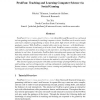1082 search results - page 160 / 217 » Learning the Semantic Meaning of a Concept from the Web |
NDQA
2003
13 years 9 months ago
2003
Early TREC-style Question Answering Systems were characterized by the following features: (a) the answer of the question was known to be included in a given local corpus, (b) the ...
CSEE
2011
Springer
12 years 11 months ago
2011
Springer
Pex4Fun (http://www.pexforfun.com/)from Microsoft Research is a web-based serious gaming environment for teaching computer science. Pex4Fun can be used to teach and learn computer...
SEMWEB
2009
Springer
14 years 22 days ago
2009
Springer
The objective of the Market Blended Insight (MBI) project is to develop web based techniques to improve the performance of UK Business to Business (B2B) marketing activities. The a...
RSS
2007
13 years 9 months ago
2007
— While robot mapping has seen massive strides , higher level abstractions in map representation are still not widespread. Maps containing semantic concepts such as objects and l...
ICTAI
2007
IEEE
14 years 2 months ago
2007
IEEE
We review a method of generating logical rules, or axioms, from empirical data. This method, using closed set properties of formal concept analysis, has been previously described ...

